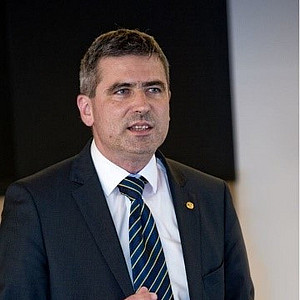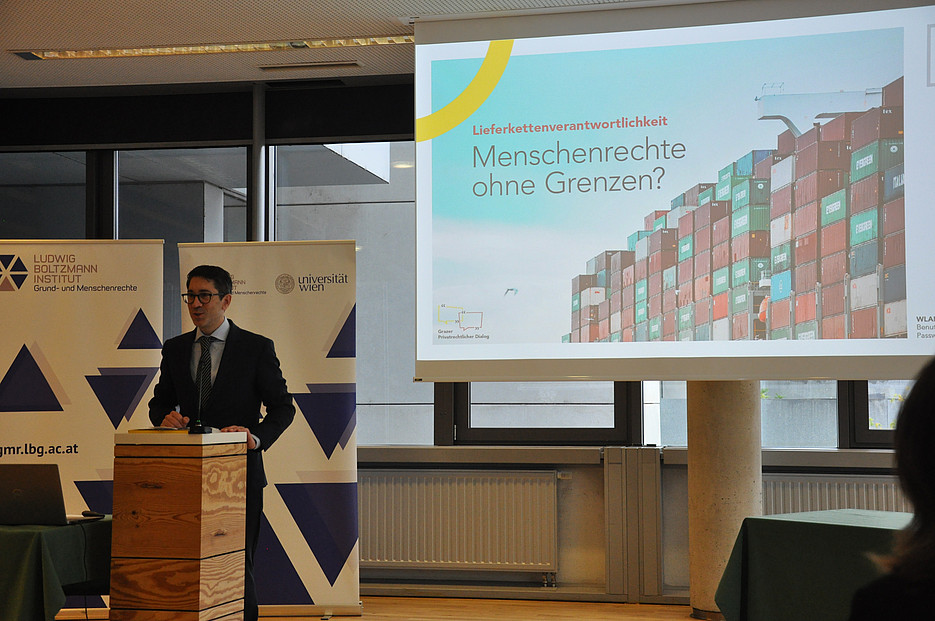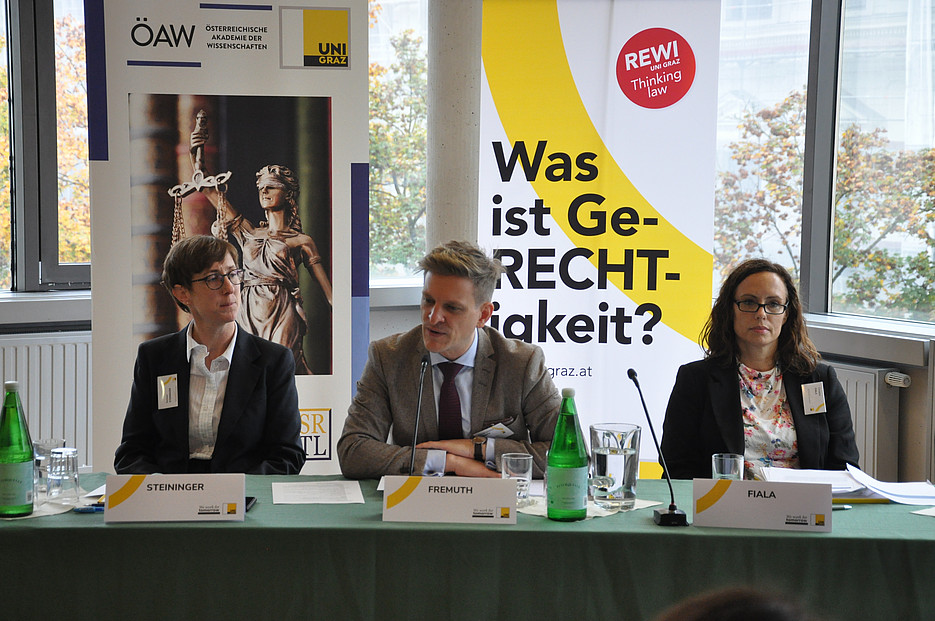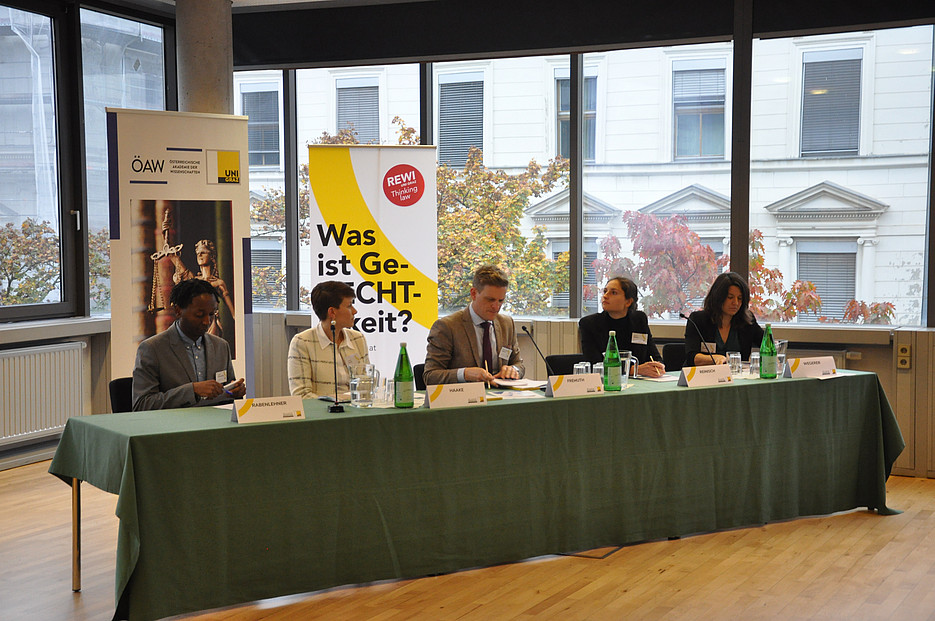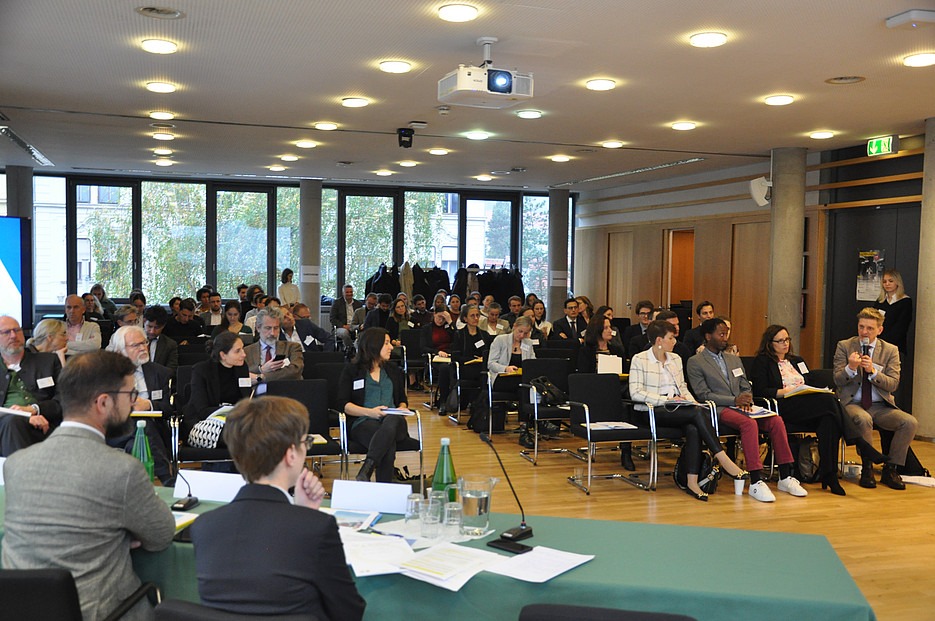At the end of July 2024, the EU Directive on corporate sustainability due diligence, or CSDDD for short, came into force. Member states now have two years to transpose it into their national law. To mark this occasion, the Institute for European Private Law of the Austrian Academy of Sciences and the University of Graz and the Centre for European Private Law of the University of Graz and ECTIL, together with the Ludwig Boltzmann Institute of Fundamental and Human Rights and the University of Vienna, organised a conference on corporate responsibility in value and supply chains on 18 October 2024 at the University of Graz. Experts from various legal disciplines, including stakeholders, presented the development of supply chain responsibility. The focus of the presentations and discussions with the almost 90 participants was on due diligence obligations and liability as standardised by the new directive (CSDDD).
The event was opened by Univ.-Prof. Dr Walter Doralt, Vice Dean and Dean of Research at the Faculty of Law, as well as by Assoc. Prof. Dr Barbara C. Steininger, University of Graz, and Univ.-Prof. Dr Michael Lysander Fremuth, University of Vienna. In the opening lecture, ChristineFiala, judge and advisor at the Federal Ministry of Justice, presented the content of the CSDDD and possible implementation plans.
The presentations in Panel I focussed on due diligence obligations. Assistant Professor Dr StephanieNitsch, University of Vienna, reported from the perspective of civil law and retired Professor Dr Wolfgang Benedek, University of Graz, presented the obligations from the perspective of international law. Dieter Seifert, AVL, who kindly stood in for Dr Yorck Schmidt, AVL, at short notice, provided information on the risks and opportunities in relation to the change in global corporate responsibility as a result of the CSDDD.
The presentations in Panel II focussed on civil liability. Prof Dr Jonas Knetsch, Université Paris 1 Panthéon-Sorbonne, gave a presentation on the CSDDD liability regulation against the background of French experience. The requirements and procedural aspects of liability under Art. 29 CSDDD were discussed by Assoc. Prof. Dr Barbara C. Steininger, University of Graz, and Dr David Messner-Kreuzbauer, Institute for European Tort Law of the Austrian Academy of Sciences and the University of Graz.
Strategies for the practical implementation of due diligence obligations were dealt with in Panel III. Dr CamillaHaake and Stephen Rabenlehner, MA, both of the Ludwig Boltzmann Institute of Fundamental and Human Rights, provided information on the opportunities and risks associated with verification by independent third parties in the activity chain. The presentation by MMag.a Julia Wegerer, AK Vienna, dealt with the effective involvement of stakeholders. Johanna Reinisch, LL.M., WKÖ, presented what an efficient, practical and unbureaucratic implementation of the CSDDD could look like.
The topic of Panel IV was international law enforcement. Prof. Dr KirstenSchmalenbach, Paris Lodron University Salzburg, dealt with jurisdictional issues of supply chain responsibility and Prof. Dr Brigitta Lurger, LL. M. (Harvard), University of Graz, presented the cornerstones of private international law in the supply chain.
Lively discussions took place at the end of each panel and the opportunity for in-depth dialogue on the topic between representatives from academia and civil society as well as practitioners was also successfully used during the breaks.
Legal panel
Corporate liability as genuine organisational liability
The Institute for European Tort Law of the Academy of Sciences and Humanities and the University of Graz and the European Centre for Tort and Insurance Law cordially invite you to the following legal panel discussion:
Lecture: "Corporate liability as legal organisational liability"
Speaker: Carsten König
Time: 5 June 2024
Place: Seminar room of the ETL/ECTIL (Reichsratsstraße 17/2, 1010 Vienna)
According to conventional understanding, tortious corporate liability is linked to individual human behaviour. In contrast, Carsten König argues in his lecture that corporate liability should be more organisation-related. He refers this not only to liability for negligence, but also to liability for intent. The aim is to use corporate liability to also cover organisational risks that can arise, for example, from the division of labour and knowledge fragmentation. To this end, a new dogmatic model of tortious corporate liability is proposed.
The lecture is scheduled for approx. 30 minutes, followed by a discussion.
Participation is free of charge. We kindly ask you to register atetl(at)oeaw.ac.at.

Legal panel
Procedural aspects of liability
The Institute for European Tort Law of the Austrian Academy of Sciences and the University of Graz and the European Centre of Tort and Insurance Law cordially invite you to the following Juristenrunde lecture:
Lecture: Procedural aspects of liability
Speaker: Attila Menyhárd
Time: Thursday, 23 May 2024 at 11:00
Place: Seminar Room of ETL/ECTIL (Reichsratsstraße 17/2, 1010 Vienna
Discussions on certain central issues of liability are mostly limited to substantive law aspects. Civil procedure, however, may either be a solution to certain problems like assessing probabilities, reversing burden of proof or impediments to enforcement of law, e.g. if the courts are bound to claims of parties stronger than it would be reasonable. In other aspects, like establishing compensable loss, it is unclear where the limits of competence of the expert appointed by the court lie.
The lecture is scheduled for 30 minutes, with an opportunity for discussion afterwards.
Participation is free of charge. If you would like to attend, please register via etl(at)oeaw.ac.at.
